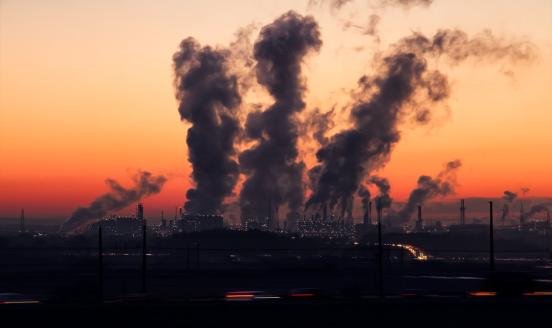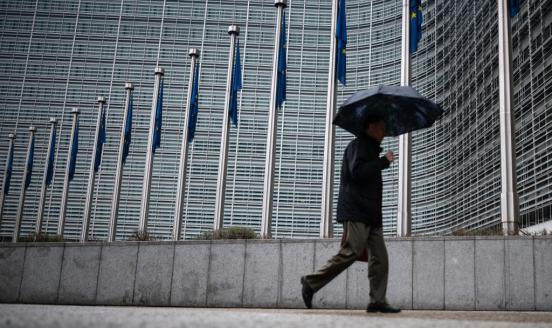Central banks don’t have to pick winners and losers to fight climate change
Disclosures and financial regulation don’t get enough respect as tools to reduce emissions.
Suddenly central banks are in the middle of the climate-policy debate and it always seems to zoom in on one question: Should they stop buying “brown” bonds? Either yes, and the traditional inflation-fighting mandate goes out the window, or no and the central bank is leaving the planet to burn.
The truth is, there is a lot that the European Central Bank, the Federal Reserve and other global leaders can do to support the climate transition without trampling on their traditional duties. Disclosure requirements and financial regulation don’t get nearly enough attention, considering the very real impact they will be able to have. By setting standards and making banks take stock of climate-related risks, central bankers can help change the world without changing their fundamental mandates.
Mandates reinforce credibility
Mandates matter. The main thing that makes a central bank powerful is its credibility. When financial markets believe you have what it takes, your promise to do whatever it takes is taken seriously. That’s how the ECB kept the euro from falling apart while European governments put together a longer term safety net, and how the Federal Reserve kept the coronavirus crisis from creating a financial crisis as well.
In both scenarios, the central banks made a convincing case that preserving economic stability through financial channels was essential to their core purpose of keeping monetary systems going. The ECB’s primary task is to preserve price stability, while the Fed has a dual mandate of fighting inflation and also unemployment. A well-functioning financial system is essential.
Since the global financial crisis of 2009, however, the definition of a well-functioning financial system has started to blur. No longer are the central banks only conducting open-market operations to keep interest rates on target. Now they sit on massive balance-sheet expansions, taken on to combat widespread economic weakness. Democratically elected politicians still drive fiscal policy, but central bank bond-buying means technocratic economists are playing a bigger role than people expected. Still, they have stuck to financial channels, even if their mandates have become a bit stretched.
Winners and losers
Making climate change a portfolio consideration would be a big shift. Some would argue that the ECB is already influencing climate finance by buying corporate bonds, which are disproportionately issued by carbon-intensive industries. By nudging quantitative easing toward a more carbon-neutral portfolio, one could counteract the skew naturally present in the market.
Others, such as Bundesbank President Jens Weidmann, say that any move to direct asset allocation is a step too far: “it is not up to us to correct market distortions and political actions or omissions.” Fed Chairman Jerome Powell struck a similar tone and noted that Congress hasn’t asked the Fed to add climate oversight to its duties.
It’s tempting to stop and frame the debate right there. But that would overlook the other, less confrontational changes that also are under discussion—and that have the potential to make a big difference for the environment without breaking democratic barriers.
Sustainable finance
Europe in particular is at the forefront of this movement. The ECB has pledged to assess climate risks in its 2022 bank stress tests. It’s shifting into sustainable finance for its own portfolio of retirement and institutional investments. And there seems to be a growing consensus, Weidmann included, that climate disclosures should be a requirement for any asset that wants to be eligible as euro system collateral.
This is a big deal. Standards for how banks and corporate bond issuers should disclose climate-related risks are intensely under development, such as the European Union’s forthcoming update to its nonfinancial reporting directive or the industry-led Task Force On Climate-related Financial Disclosures. Once these standards are set it will take time for them to be widely adopted in the markets. But if the ECB begins to require them, it could quickly usher in a new era of environmental transparency. The Fed also has begun debating the issue.
Disclosure is powerful. Dr. Chavi Eve Karkowsky has written about how requiring doctors to put an X in a spreadsheet every time they made an elective choice to deliver babies early, before 39 weeks gestation, was enough to dramatically reduce such deliveries and the complications that too often accompanied them. If new standard climate disclosures result in a similar spate of Xs on spreadsheets, governments and major investors will have a much clearer sense of where the risks lie, making it easier to decide where and how to act.
Central banks thus have an opportunity to make a meaningful impact without taking up activist investing. As it turns out, they can have a big effect on how the financial sector treats climate risks, without stepping into the minefield of directly picking winners and losers in the markets. That’s something to welcome, not to see as coming up short.



